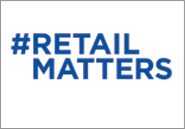Albertans work in retail.
storefronts in Alberta
of retailers are small businesses
Alberta Retail Trade GDP
Alberta’s average hourly compensation in retail
in Alberta Retail Sales
Source: Stats Canada
Why Alberta Retail Matters

When your local candidates knock on your door or you meet them at an event, take time to share your experiences and the pride you have for Alberta’s retail industry.
Be sure to also let them know that you are part of Alberta’s largest private employment sector, and that retail also has a significant impact on the success of several other industries, such as neighbouring restaurants, as well as jobs in transportation, construction, property management, information technology and financial services.
Here are some ideas that you can share with your candidates while spreading the word about retail:
- Retail is the largest private sector employer in Alberta, representing 17,000 stores and a workforce of over 265,000, or about 11% of all employed Albertans.
- Sales in 2022 reached $97.8 Billion, reflecting a year over year increase of 12.9% recover following the pandemic.
- The sector presently has over 7,300 vacancies and a five-year projected additional new position requirement of 28,000 additional workers at all levels
- Brick and mortar retail remains the foundation of healthy main streets and malls.
Every election provides Albertans with the ability to shape their government and help to ensure that future members of the Legislative Assembly understand the role merchants play in Albertan’s lives and our economy.
Where the Parties Stand

Question |
UCP |
NDP |
|---|---|---|
| 1. Ensure a predictable formula for future raises to minimum wage | Yes | Yes |
| 2. Retain the student minimum wage rate differential | Yes | No |
| 3. Work with RCC on Retail Safety and Crime issues | Yes | Yes |
| 4. No additional corporate taxes or PST | Yes | Yes |
| 5. Maintain fiscal responsibility and taxes | Yes | Partially |
| 6. Implement strategies to support retail job gaps and growth | Likely | Yes |
Retail Council of Canada sent a questionnaire to all political parties addressing the key issues affecting retail in the province. The questions can be read below.
- Will you commit to linking future increases to minimum wage to Alberta’s Consumer Price Index, or some similar predictable formula?
- Are you prepared to retain a Student Rate differential?
- Will you be an active partner in retail specific response to retail safety and crime?
- Are you prepared to maintain Alberta’s tax advantage, by not introducing additional taxes, including a provincial sales tax?
- Will you work with RCC on behalf of Alberta retailers to implement strategies that will help address projected retail labour shortages?
Below are the responses from Alberta’s political parties to these questionnaires.
ALBERTA NDP FULL RESPONSE:
Opening Comment:
Thank you for the opportunity to respond and share our position on these important issues. Rachel Notley and Alberta’s NDP are committed to working with your members to grow and diversify the Alberta economy and to provide stable, predictable leadership.
Predictable Minimum Wage Increases: Yes
We will work with you to establish a predictable, rational schedule for minimum wage, tying it to inflation as many in the business community here have advocated. We will work with you to ensure Alberta’s wages remain competitive during a time of labour shortage while providing stability and certainty for businesses.
Retaining the student minimum rate differential: No
We will eliminate the discriminatory youth minimum wage, which has been administratively complex for businesses. We value the role of the retail sector and are happy to provide further information and resources when it comes to implementation of this change.
Our approach, when combined with a 0% small business tax rate and a restoration of the STEP subsidy program, will be good for Alberta families, for businesses, and for Alberta’s economy.
Collaborate on Retail Safety and Crime: Yes
An Alberta NDP government would join RCC and other key stakeholders to take action on retail safety and crime.
Additionally, we will tackle threats to public safety especially in transit and in our downtowns by investing $40 million to hire 150 officers along with 150 social workers, mental health workers, addictions counselors, and community outreach workers to work in integrated teams with police.
While the UCP wants to eliminate the RCMP, we will maintain an RCMP presence in communities across the province. Further, we would invest an initial $10 million in specialized Rural Crime Reduction Units to fight rural crime while hiring added probation officers and investing in post-release programs to stop repeat offenders.
We will also support the revitalization of our communities and downtowns with our Hometown Alberta infrastructure funding program and support for urban renewal.
Maintain no PST: Yes
With an Alberta NDP government, there will be no provincial sales tax.
Maintain Fiscal Responsibility and Taxes: Partially
At a time of unusually high inflation, Albertans are struggling with the rising cost of living. An Alberta NDP government will hold the line on taxes Alberta families pay. With an Alberta NDP government, there will be no provincial sales tax, and there will be no increases in provincial income taxes. We will also lower residential power bills and freeze auto insurance to help all Albertans, including your members and their employees.
We are projecting surplus budgets for every year of our fully costed platform, in line with recommendations from former ATB Financial VP and Chief Economist Todd Hirsch in his report, A Better Fiscal Future: Fiscal Recommendations to Position Alberta for Success.
Support for Small Businesses… Alberta’s tax advantage allows us to attract top talent while supporting businesses and families across the province. We’ll eliminate the small business tax rate, setting it to zero for more than 100,000 small businesses, including retail establishments, restaurants, mechanic shops, family farms, and more.
Alberta business owners could save up to $10,000 per year, at an estimated cost of $150 million to the Government of Alberta.
In terms of your specific priorities, please see the responses below and feel free to be in touch with further questions.
RCC NOTE: The NDP have announced that they would raise the corporate tax rate from 8% to 11% over three years but notes the rate would still be the lowest in Canada.
Support Retail Job Gaps and Growth: Yes
Addressing labour shortages is critical to Alberta’s long-term success.
An Alberta NDP government will work with representatives from key business sectors such as the RCC, post-secondary, technical institutes, labour, and newcomer settlement agencies to grow the workforce. Working together, we can support each industry’s unique labour requirements and attract talented individuals who can bring new ideas and skills to Alberta.
UNITED CONSERVATIVE PARTY FULL RESPONSE
Opening Comment:
We would be happy to discuss other strategies with the Retail Council of Canada.
Predictable Minimum Wage Increases: Yes
We have no plans to raise the minimum wage, but at such time as it does need adjustment a UCP government would work with retailers and other employers to find a predictable mechanism that is fair to workers. We would avoid the significant job losses and workplace disruption that many retailers experienced with the hasty $15/hour (25%) hike.
Retaining the student minimum rate differential: Yes
The UCP would retain the student rate differential as a fair way to get more young Albertans into their first job.
Collaborate on Retail Safety and Crime: Yes
The UCP government has taken a strong stand to help take back our streets from gangs and criminals and find the right help for those with mental health and addictions issues.
We’ve added officers to both Edmonton and Calgary’s downtowns, and re-deployed Sheriffs to assist them. We’ve also made record investments in mental health and addictions.
At unitedconservative.ca you can see our recent announcements to enhance this work with both new initiatives to fight crime on the streets, as well as record investments and innovation in mental health and addictions. We are on the right track to get your front-line employees the peace of mind they deserve at work.
We would be happy to meet with retailers and other stakeholders after the election to discuss how best to deploy these resources in collaboration with store owners and employees as well as other community groups.
Maintain no PST: Yes
Just before the election we announced that we would add personal tax increases and business tax increases to the Taxpayer Protection Act which we respect for prohibiting sales taxes without a referendum.
Maintain Fiscal Responsibility and Taxes: Yes
Our first campaign announcement was the announcement of a lower rate of taxation on the first $60,000 of income, which will help all taxpayers with up to $750 savings; it should be especially helpful in attracting and retaining employees to work in Alberta’s essential retail sector.
We can afford to make life more affordable for Albertans because of some difficult work done over the last four years to get better value from tax dollars without raising them. The NDP have made clear that, if elected again, they will raise business taxes a lot, but increase spending much more. The resulting deficits will add pressure for sales taxes fix a so-called “revenue problem” which would be in reality be an NDP spending problem.
Support Retail Job Gaps and Growth: Maybe
The UCP is already working on improving the Alberta Immigration Nominee Program to expand and tailor it more to our labour shortages. Our tax reductions will also be an incentive to work in Alberta, as will one of the most affordable home prices in Canada. We would be happy to discuss other strategies with the Retail Council of Canada.
Alberta Key Retail Issues
A Predictable Minimum Wage
Unpredictable increases to the provincial minimum wage can hurt the economic stability of retail businesses, and can result in lost jobs, especially amongst less experienced youth.
Recommendations
- Link inevitable future increases to the provincial minimum wage to Alberta’s Consumer Price Index, or some similar predictable formula.

Supporting Student Jobs

The retail sector offers great part-time opportunities for students entering the workforce for the first time. Alberta’s student rate has helped support the employment of those that don’t bring the same level of ability that experienced workers can provide.
Recommendations
- Support employment for those entering the workforce for the first time by retaining the Student Rate differential.
Retail Safety and Crime
Retail employees are on the front line of endless threats to their safety, as a result of prolific and often violent offenders using a range of dangerous weapons and tactics, as well as complex interactions with those dealing with mental health and drug induced behaviours.
Recommendations
- Ensure the Government of Alberta is an active and contributing partner in collaborative discussions led by RCC between police agencies, retailers and other important stakeholders.

Retail Job Growth
 A recent labour market study for Alberta’s retail sector indicated significant shortages in the workforce necessary to meet current and future growth expectations, including 7,300 current vacancies and by 2028 a shortfall of 28,000 workers at all levels of the industry.
A recent labour market study for Alberta’s retail sector indicated significant shortages in the workforce necessary to meet current and future growth expectations, including 7,300 current vacancies and by 2028 a shortfall of 28,000 workers at all levels of the industry.
Recommendations
- The government must be at the table as RCC and Alberta’s retailers investigate and implement strategies that will help support the sector’s labour requirements and growth.
Fiscal Responsibility and Taxes
 With projected billion-dollar surpluses, Alberta is well positioned to find the right balance to support economic growth and opportunity through low taxation and strategic investments, while meeting the needs of Albertans.
With projected billion-dollar surpluses, Alberta is well positioned to find the right balance to support economic growth and opportunity through low taxation and strategic investments, while meeting the needs of Albertans.
Recommendations
- RCC supports this balanced approach and believes Alberta’s tax advantage should be maintained, by not introducing additional taxes, including a provincial sales tax
Retail Matters
Use these tools to contact your local candidates and make your voice heard.
1. Find your candidates
Use the Alberta Elections tool to find candidates and their contact info for your riding.
2. Print your sign
Show your pride in retail by posting a photo of your retail staff holding a #RetailMatters sign or a photo of your store.
3. Tell candidates #RetailMatters
Use these links to send parties your staff photos or customized tweets.
- New Democratic Party: @albertaNDP
- United Conservative Party: @Alberta_UCP
You can also send a letter to your candidate
Let your candidates know how important retail is to Albertans by sending a letter. RCC has created a pre-written template you can use to make sure candidates and elected officials understand retail’s impact in your community and how they can support our sector.
Contributing to political parties – what you need to know
Contributing to a campaign can be an effective way to build relationships with candidates in your riding.
Make sure that you understand the rules before lending your support to a provincial political party and its campaign. Here is a quick summary of things to remember:
Who can contribute?
Only individual residents of Alberta may make political contributions. In other words, businesses and unions are not allowed to make political contributions in Alberta.
What is the contribution limit?
Only persons ordinarily resident in Alberta can contribute a maximum of $4,300 per calendar year to any combination of political parties, constituency associations, candidates, and leadership contestants.
What is considered a contribution?
A contribution is any money, real property, goods or services, or the use of real property, goods or services, provided to or for the benefit of a political entity without compensation from the political entity to the donor.
For more information on political donations and contributions, see the Alberta Election page.
Contact Us
 For questions or to find out more, contact John Graham jgraham@retailcouncil.org or 204-926-8624.
For questions or to find out more, contact John Graham jgraham@retailcouncil.org or 204-926-8624.


